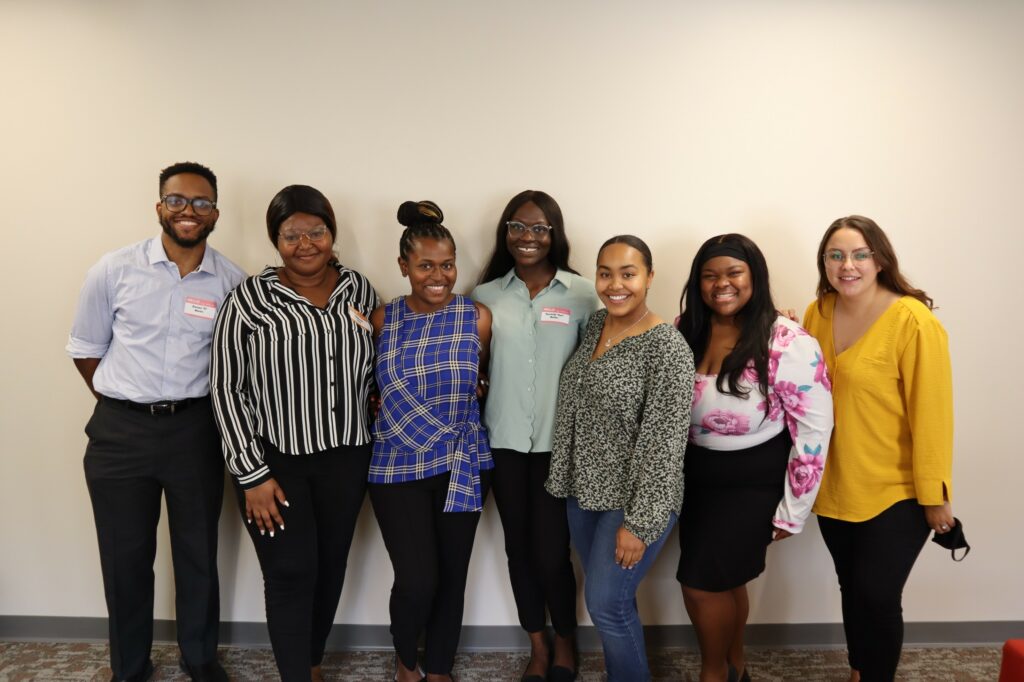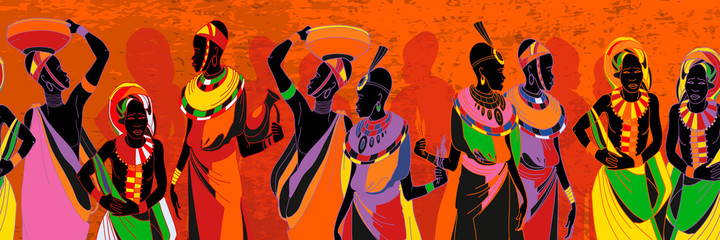
Community Engaged Undergraduate Research involves both graduate and undergraduate researchers through several community-engaged research programs.
The Center for Africana Studies and Culture works with the Olaniyan Scholars Program to promote the development of community-engaged undergraduate research focused on Black populations across disciplines. This program also engages high school-aged youth to participate in summer camp research experiences that introduce them to research and how it can benefit populations of color. Olaniyan projects are based on participatory social justice research-based in community need, such as a recent project that studied how COVID-19 has affected Black communities.
One of the projects in which the Olaniyan Scholars have engaged is the Echo’s in the Black Atlantic Digital Humanities Project. The project utilizes autoethnography to engage students in “mapping” their proximity to the lasting effects of enslavement and colonialism. The use of scholarly research and interactive opportunities for discourse will guide the student researcher’s interpretation and analysis of the context of slavery in the building of global institutions, economies, policies, and social structures that uphold white supremacy. The core focus of the project will be framed in explorations that do not privilege a proximity to whiteness, but a center of an Afrocentric consciousness of remembrance that confronts empire as a paramount theme. The student researchers are tracing the routes of the slave trade and their connections to its residual effects through the lens of interdisciplinary themes that relate to and center the Humanities, Arts, and Social Sciences (HASS).

Each year, two Africana Studies students will be selected as Bundles Scholars and will engage in scholarly research of Black issues with mentorship from Bundles and other Africana Studies faculty.
The Bundles Scholars program, named for the inaugural prestigious fellow, A’Lelia Bundles, was announced in February 2022. Watch for more information to come on the Scholars and their research.
The Through Their Eyes Scholars Program, which provides educational and research opportunities for Black and Native and Indigenous youth, is based on an effort to honor the displacement of Black and Indigenous populations who occupied the lands on which the Indiana University Indianapolis campus now stands.
The Heritage and Humanities Scholars Program, which promotes community-engaged graduate and undergraduate research, creates and establishes knowledge bases for real estate and city developers working within areas significant to Black cultural heritage and history.
 The Institute for the Study of Undergraduate Researchers of Color (ISURC) serves as a national organization that promotes greater access and participation of underserved student populations of color in community-engaged undergraduate research programs and experiences.
The Institute for the Study of Undergraduate Researchers of Color (ISURC) serves as a national organization that promotes greater access and participation of underserved student populations of color in community-engaged undergraduate research programs and experiences.
One of its most important mandates is to promote the development of knowledge, scholarship, and practices focused on supporting and mentoring students of color who participate in undergraduate research programs toward academic and professional success. This is achieved through engaging and collaborating with community experts and groups, who guide student research endeavors and the products generated through faculty-directed undergraduate research projects.
The ISURC also has a mandate to prioritize establishing culturally inclusive campus environments and/or sanctuary spaces in which minoritized students of color, who often feel alienated on predominantly white college and university campuses (PWIs), feel more welcome. Understanding how to better create Culturally Inclusive Sanctuary Spaces (CISS) increases the university’s ability to enable all students to be better integrated and to feel valued as they develop a sense of belonging conducive to academic success.
Through the work of the Institute, knowledge and scholarship focused specifically on minoritized and underserved student populations and communities is broadened and recentered to promote the expansion of access, equity, and diversity within universities and colleges through community-engaged undergraduate research and mentoring programs and practices. The Institute also pursues scholarship and praxis focused on the importance of culturally relevant and inclusive practices in mentoring and undergraduate programming, curriculums, and activities to develop training programs for community members, faculty, staff, and graduate students.
The Institute works to achieve these goals through concentrating its efforts in key areas:
These goals are achieved with attention to balancing STEM and humanities undergraduate research programs, activities, curriculums, and initiatives wherever possible to provide students with the broadest range of possibilities, opportunities, and participation in mentoring relationships and research projects and initiatives.
The ISURC promotes community-engaged undergraduate research by partnering with the IU Indianapolis Office of Community Engagement, the Center for Service and Learning, the School of Education, the Institute for Engaged Learning, and the professional schools around IU Indianapolis campus wherever appropriate.
The ISURC is affiliated with the Center for Africana Studies and Culture but functions as an independent entity. As such, the Institute has its own executive director, associate director, assistant coordinator, administrative support staff, budget, programming, curriculums, initiatives, and advisory board. The Director of the Center for Africana Studies and Culture serves on this board. The Executive Director of the Institute reports to the Dean of the School of Liberal Arts.
Additionally, Institute initiatives are coordinated with the Africana Studies Program and the Center for Africana Studies and Culture, allowing for enriching synergies and collaborations.
Dr. Ronda C. Henry Anthony serves as Executive Director of the Institute for the Study of Undergraduate Researchers of Color. She maintains her role as Executive and Founding Director of the Olaniyan Scholars Program. Dr. Patricia Jordan Turley serves as Associate Director of the Institute and the Olaniyan Scholars Program.
Contact Les Etienne, Founding Executive Director of CASC.